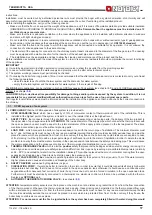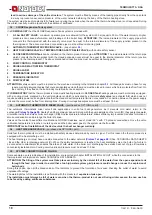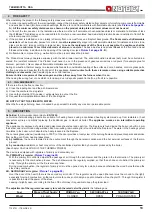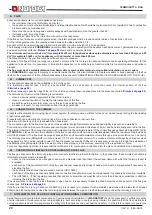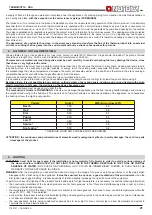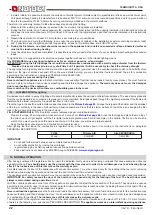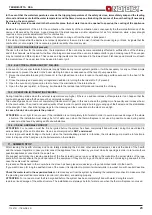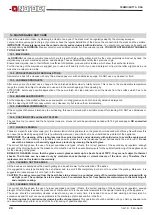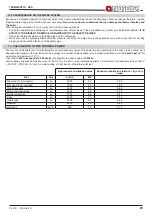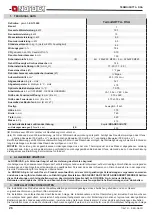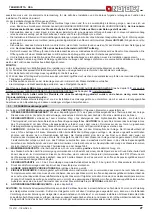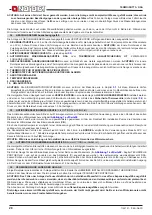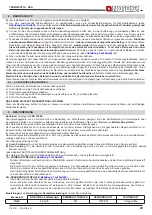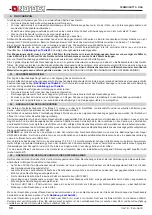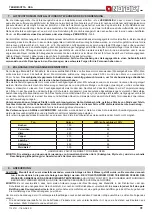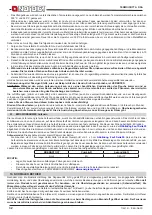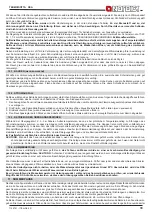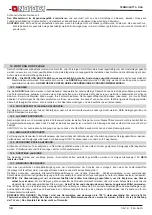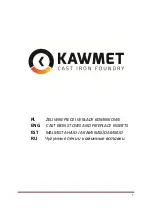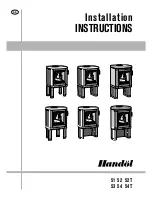
19
4. FIRE SAFETY
When installing the product, the following safety measures must be observed:
a) In order to ensure sufficient thermal insulation, respect the minimum safety distance from objects or furnishing components flammable
and sensitive to heat (furniture, wood sheathings, fabrics. etc.) and from materials with flammable structure (see
-
A
).
All the minimum safety distances are shown on the product data plate and lower values must not be used
.
b) In front of the furnace door, in the radiation area there must be no flammable or heat-sensitive objects or material at a distance of less
than
100 cm
. This distance can be reduced to 40 cm where a rear-ventilated, heat-resistant protection device is installed in front of the
whole component to protect.
c) If the product is installed on a non totally refractory floor, one must foresee a fireproof background.
The floors made of inflammable
material
, such as moquette, parquet or cork etc.,
must be replaced
by a layer of no-inflammable material, for instance ceramic, stone,
glass or steel etc. (size according to regional law).
In case the replacement of the floor is not possible, the appliance shall be
placed on a minimum 12 cm thick slab made of stone or concrete
. The base must extend at least
50 cm
at the front and at least
30 cm
at the sides, in addition to the opening of the loading door (see
B
).
d) No flammable components (e.g. wall units) must be present above the product.
The Product must always operate exclusively with the ash drawer inserted. The solid combustion residues (ash) must be collected in a
sealed, fire resistant container. The Product must never be on in the presence of gaseous emissions or vapours (for example glue for
linoleum, petrol etc.). Never deposit flammable materials near the Product.
During combustion, thermal energy is released which leads to considerable heating of the surfaces, doors, handles, controls, glass parts,
the flue gas pipe and possibly the front part of the appliance.
Avoid contact with these elements unless using suitable protective
clothing or accessories
(heat resistant gloves, control devices).
Ensure children are aware of these dangers and keep them away from the furnace when it is on.
When using the wrong fuel or one which is too damp, due to deposits present in the flue, a flue fire is possible.
4.1. IN A EMERGENCY
If there is a fire in the flue connection :
a) Close the loading door and the ash drawer door
b) Close the comburent air registers
c) Use carbon dioxide ( CO
2
powder ) extinguishers to put out the fire
d) Request the immediate intervention of the Fire Brigade
DO NOT PUT OUT THE FIRE WITH WATER.
When the flue stops burning, have it checked by a specialist to identify any cracks or permeable points.
5. DESCRIPTION
Definition
: thermo-product according to
EN 13240.
La Nordica thermoheating products are suitable for heating homes using a centralised heating system made up from radiators or heat
convectors entirely or partially replacing the traditional gas or diesel oil boiler.
The appliance works as an intermittent operating
appliance.
The appliance is composed of painted and galvanised sheet steel and cast iron. The fireplace is found inside the boiler, is built in 4 mm
thick steel and is reinforced using welded nails. A swivelling, removable grid is found inside the fireplace. The water in the heating system
circulates in the boiler, which absorbs the heat produced in the fireplace.
The ceramic glass window (resistant up to 700°C) of the door provides a lovely view of the burning flames and prevents sparks and smoke
from getting out. Room heating takes place:
a) by radiation
: the heat is radiated into the environment through the panoramic window and the hot external surfaces of the thermo-
product;
b) by conduction
: radiators or heat convectors of the centralised system fed by hot water produced by the boiler.
(See chapter CALCULATION OF THE THERMAL POWER)
The device is equipped with registers of primary and secondary air.
1A- PRIMARY air register
(
)
With the primary air control is adjusted the passage of air through the ash drawer and the grate in the fuel direction. The primary air
is necessary for the combustion process. The ash drawer must be regularly emptied, so that the ash does not obstruct the primary air
entry. Through the primary air the fire is also kept alive.
During wood combustion, the register of primary air must be opened only for a while, because otherwise the wood burns fast and the
stove may overheat.
2B - SECONDARY air register
Over the door of the hearth there is the secondary air control. This regulator must be open (the lever must be moved to the right),
especially for wood combustion, so that un-burnt carbon does not undergo a post-combustion. See chapter 10. Through this register it
is possible to adjust the power of the stove.
Leaving it slightly open, according to the flue of the chimney, it is possible to keep the glass clean.
The adjustment of the registers necessary to reach the rated calorific yield
is the following one :
Fuel
Mass of fuel hourly
PRIMARY air
SECONDARY air
TERTIARY AIR
Wood
4,4 kg/h
CLOSED
OPEN
PRE-ADJUSTED
Summary of Contents for TermoISOTTA - DSA
Page 2: ......













